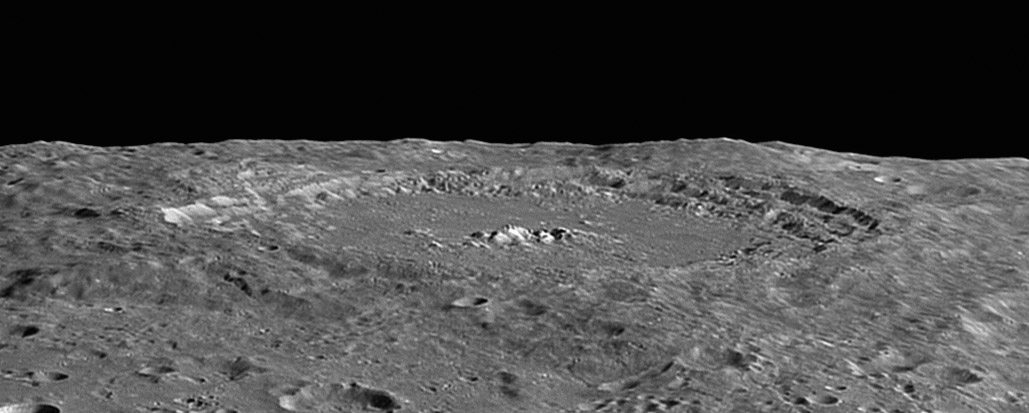November 14, 2018
A Bigger Copernicus
Originally published August 31, 2009
No comments for 5 days - is everyone on vacation?

image by Pascal Bayle, France
As the spacecraft approached the limb, Copernicus, the most majestic of nearside craters came into view. But wait. What is Copernicus doing within that mountainous terrain? And there is no spacecraft orbiting the Moon now capable of acquiring such an image - the Indians justlost contact with their Chandrayaan-1, both the Japanese and Chinese ships crashed at the end of their missions, and LRO can't take wide field views like this. Hmm. But Pascal doesn't have a spaceship, as far as I know, just a 14" scope. So the limb projection must be real and the only limb area with such mountainous terrain is around the south pole. This looks something like Drygalski, but it's not. That leaves Hausen, the Copernicus-look alike beyond Bailly. Hausen is nearly twice Copernicus' diameter (167 vs 93 km) but otherwise is quite similar with broad terraces, flat floor and central peak. The Lunar Orbiter image shows that central is not the right adjective for Hausen's peak for it is off-center. In fact, Hausen is a crater in transition from the morphology of a normal complex impact crater to a central peak basin. Hausen's peak is not surrounded by a well-defined ring as is Compton's, but there is definitely a small incomplete central ring seen on the Orbiter view and recognizable in this excellent Earth view. Something else visible in the Orbiter and then seeable in Pascal's image is the impact melt behind the peak and to its right. The preservation of impact melt and the paucity of subsequent impacts suggest that this is a geologically young crater, but detailed studies suggest it is older than Copernicus. One thing to be resolved is it depth - the two existing determinations are 6.0 and 3.8 km - I bet the higher value is closer to the truth.
Chuck Wood
Update; Jim Mosher measured shadow lengths on the Lunar Orbiter image and found that a depth of 5.5 to 6 km is correct.
Technical Details
13 Aug 2009, 03.59.50 UT. 14" scope + DMK 21AF04 + POWERMATE x2.5.
Related Links
Rükl plate 71
Yesterday's LPOD: Queen of Starland
Tomorrow's LPOD: Ramparts
COMMENTS?
Register, Log in, and join in the comments.



